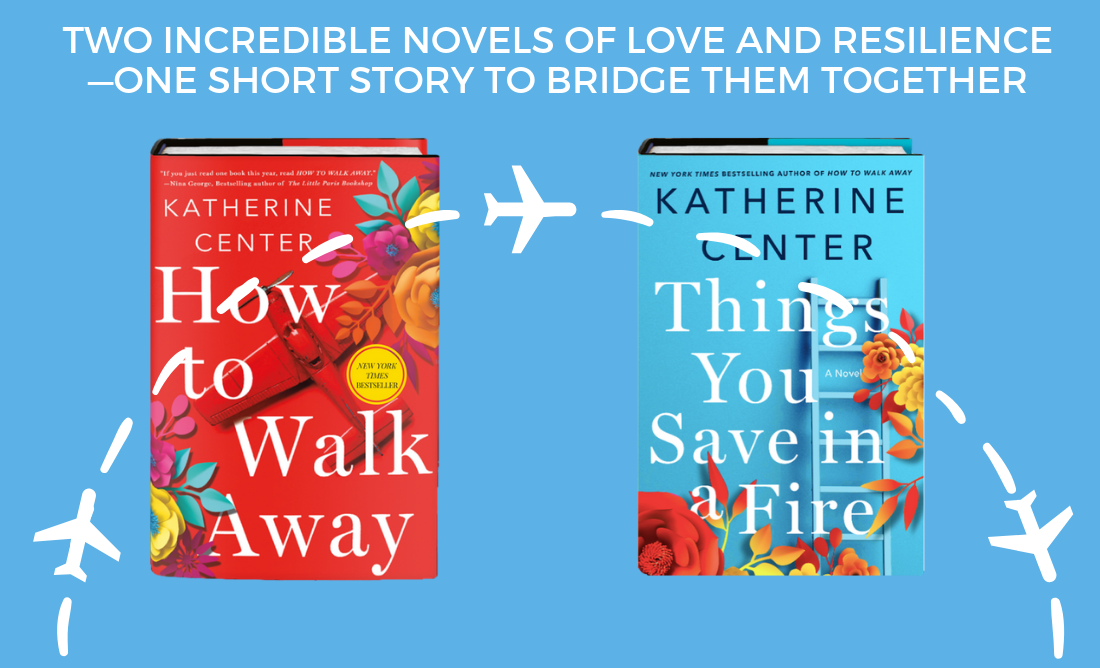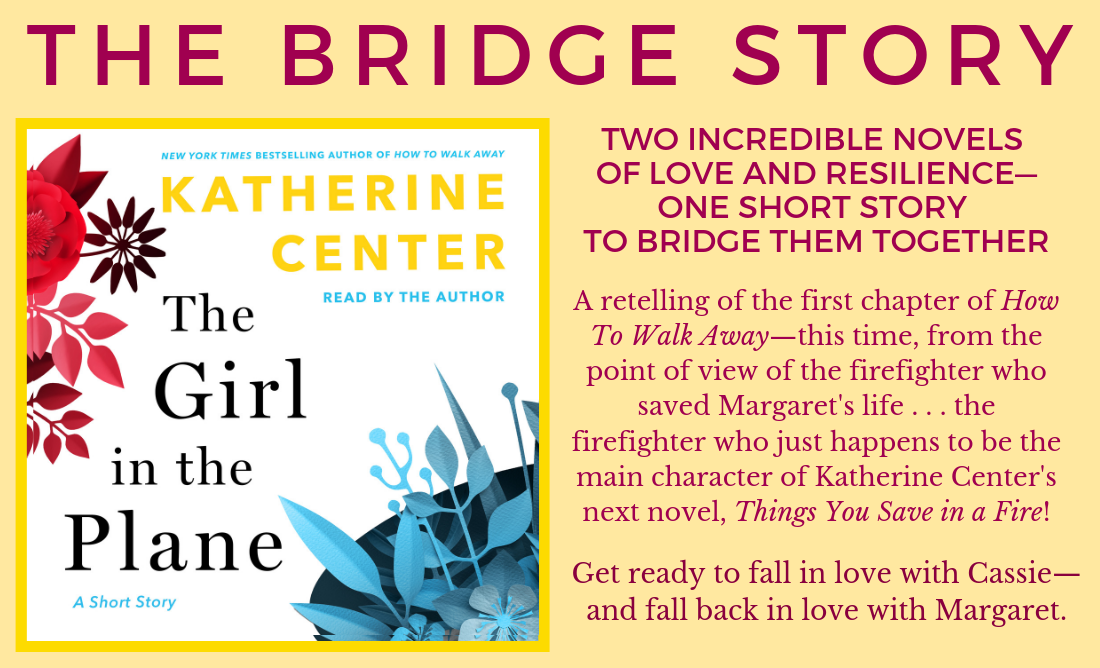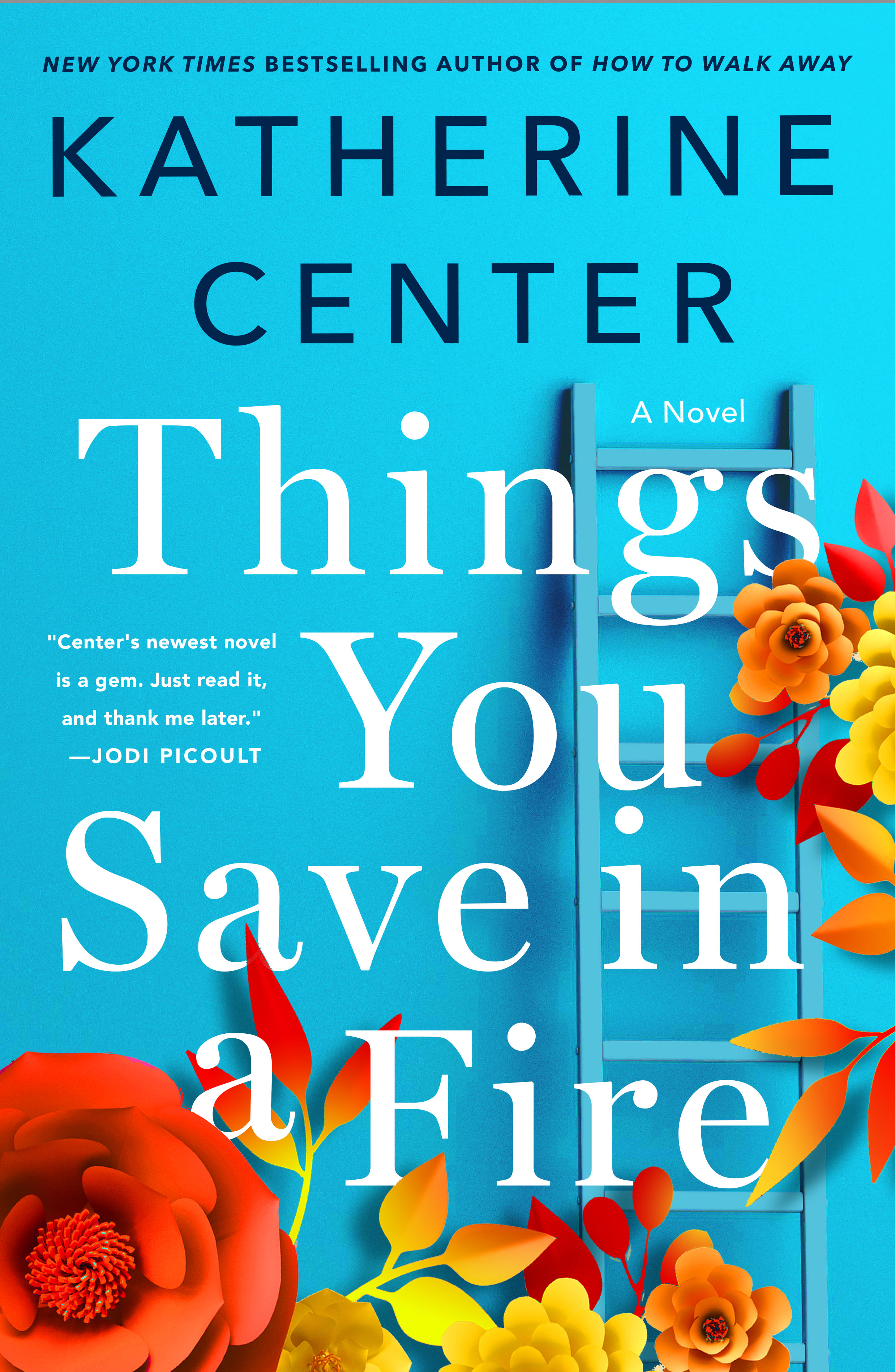

LISTEN to the story HERE—read by the author herself—for free!!!
Listen on Google Play ⬆️ HERE!
Listen on on Apple Books ⬆️ HERE!
The story is also printed in the back of the paperback edition of How to Walk Away.
Scroll down ⬇️ to read the story right here on the website!!

Reader Reviews
“In ‘The Girl in the Plane,’ a short story by Katherine Center, we get a glimpse of our favorite characters from “How to Walk Away” and “Things You Save in a Fire.” Here, Katherine Center bridges the gap between both novels when a female FireFighter arrives at the scene of a plane crash where a woman is trapped inside. If you’ve read both of the aforementioned novels, you know these women to be Cassie and Margaret. In just a few endearing, heartwarming pages, my insides turned to mush and I was completely entranced.”
—SUSANNE
“Loved loved loved this little feature!!”
—TJ
“What an amazing tie in to both these books, and the experience of listening to Katherine read this and then reading it after was fabulous. I truly can’t preach enough her writing style. I loved how the two books are related I was not expecting that. If you loved both please pick this up!”
—MELISSA
“I loved this AMAZING short story!”
—SHAUNTELE
“I love that this novella bridges between How to Walk Away and Things You Save in a Fire. I also love that the author narrated it. Super cute and heart warming short story.”
—LAYALI
“Bonus story at the end of the ‘How to Walk Away’ audiobook. It was a treat to go back to the plane crash event, and experience it from another character’s perspective.”
—MARNIE
“How cute to have a story that links two books together. This novella is the story of the woman firefighter who saves Margaret from her plane crash in How to Walk Away. This same firefighter becomes the main character in Things You Save in a Fire. I thoroughly enjoy Katherine Center’s books always, and loved seeing her characters from a different perspective! What a great idea, and well-executed!”
—JENNY
“This short read touched my heart!”
—SOLANGE
“LOVE!!! I love the way Center weaves details into her universe, little Easter eggs for her readers to find.”
—MEGAN
“I listened to the audiobook version of this. I really enjoyed hearing the author tell the story—she even did a great accent! Loved it!”
—DEDRA
“A short story where we not only found out Cassie was the firefighter that saved Margarett but she also had a bit more influence on how Maggie’s life turned out. What a sweet surprise. 5 stars.”
—KARINA
“I just finished ‘How to Walk Away’ last night and was on to the next book so I had to read the book that bridges them together. I cried when I found out the the firefighter who saved Maggie from the plane crash knew Ian. You have to read this. The way Katherine Center connected the two characters is so heartfelt like omg it tells you something amazing about the start of Ian and Maggie.”
—DINA
“Loved loved loved this short story that tied the two books together! It was so cute.”
—REBECCA
“A short story where we not only found out Cassie was the firefighter that saved Margarett but she also had a bit more influence on how Maggie’s life turned out. What a sweet surprise. 5 stars.
“This part is so small yet so amazing. I want to thank Katherine center for writing it and narrating it in her own voice. This is a bridge between How to Walk Away and Things You Save in a Fire.”
—ARPITA
“This short story is the bridge between two of Katherine Center’s novels: How to Walk Away and Things You Save in a Fire. If you have read and enjoyed those two novels then you ABSOLUTELY MUST listen to this audio short story, as it enhances both, but more so How to Walk Away for me. I really enjoyed having both Margaret and Cassie together and a certain other character I won’t name: You’ll just have to read it to find out who it is. Listening to this short story makes me want to read both of these novels again. I really loved both of them. I will definitely be reading more of Center’s books!
I also loved that Center read the audiobook. She did very well reading it and it makes the chapter more personal hearing her actual voice reading her words. It was read in just over 30 minutes.”
—JESSICA
“This was a treat.”
—ALLI
“Loved listening to this and how it brought together Things You Save in a Fire and How to Walk Away. ❤️”
—MARLO
“I loved seeing Cassie’s involvement in Maggie’s story and how she helped to make it better for her . . . It was like seeing the behind the scenes of the story.”
—LITAL
“I loved this short story! I always love cameo’s in authors book so this was fun that she brought two main characters from two of her books together!! And it was perfect since Cassie is a firefighter and Margaret needed saving! I loved their encounter. And what Cassie’s part in Margaret’s love story was just amazing and a nice touch!! Highly recommend reading this if you have read those two books! Or even if you read How to Walk Away and want to read Things You Save in A Fire. Great free read.”
—JESS
Firefighters don’t get as many calls as you might expect for fighting fires.
Ninety percent of our calls, in fact, are for other things.
Mostly, they’re medical: Chest pain, car accidents, ODs. Kidney stones are big these days.
An astonishing number are for genuinely stupid things—little things that no one should ever call 9-1-1for. Toothaches, headaches, toe cramps, hangnails. We once got a call for a “missing earlobe.”
It’s like nobody got the memo that emergency services are for emergencies.
That’s not even the crazy stuff. We get calls all the time for ghost sightings. We get calls for lost car keys, impolite neighbors, forgotten wifi passwords, nightmares. There’s a whole subset of the population that dials 9-1-1 for any problem they can’t solve in five minutes. A guy called in one time demanding that we come to his house and tell his mother she needed to respect him. A lady once faked a heart attack so she could get a ride across town to take her kids to the zoo. One guy called us out for a skunk hiding behind his toilet tank.
And let’s not forget the woman who wanted us to move a sofa for her—and when we told her that was not our job, she called the cops to complain.
Yep.
All to say, real emergencies are not the bulk of our business.
And so when we get a real call—for an actual life-and-death situation—we’re excited. This is what we’re trained to do. This is what we’re here for. Not to bring you dental floss—to save you.
If we can.
I don’t know how to say it without sounding heartless, and maybe it’s something you can really only understand after you’ve seen far too many tragedies up close, but it’s the really bad calls that we look forward to.
The calls that matter.
Or, at the very least, the calls that aren’t Elvis sightings.
So, all that said, I’ll confess that when we got the call for a plane crash at Seger Airfield, I was kind of stoked. A plane crash. Cool. I could check another type of rescue off my firefighter bucket list. I’d never worked a plane crash before.
The tones went off through the station just we were sitting down to supper.
“Medic Two — Ladder Four — Engine Sixteen — District Four — Respond to: civilian plane crash at Seger Airfield. No visible fire.”
That was us. Engine Sixteen. The closest station.
Reichman had been smoking a brisket out back since the start of shift that morning, and he was just walking it to the table when the tones went off.
“So much for the brisket,” our captain said, as she grabbed a slice of loose-cut and popped it into her mouth.
We left the rest on the table under a crumpled piece of tin foil.
Sixty-seconds later, we were rolling, and we called dispatch for updates. Multiple calls to 9-1-1 confirmed that a small private plane had cartwheeled across the runway during landing.
Awesome.
There’s a feeling you get as you head out to a real call that’s like nothing else in the world. It’s tension, excitement, focus—and the feeling that you’re about to do something genuinely important. We’d been dispatched to this field before, but never for an actual crash—once for a false alarm in the hangar, once for a fuel spill, and once for a guy who got locked in the bathroom.
This was different.
Riding in the engine, I watched the streets slide by in that otherworldly way they do at the start of a call. It was dusk, and the clouds were threatening rain. At first, the drive was just dreamy and surreal, like always. Children in parks stopped to watch us go by. Even fully grown adults raised their hands to wave, as if they were seeing celebrities—or maybe just old friends.
Then, the rain started, and everybody disappeared indoors.
“Has anybody worked a plane crash before?” I asked the guys.
“They’re a lot like car crashes,” Hernandez said.
“But with wings,” Reichman added.
“Thanks,” I said, flaring my nostrils.
After a minute, Big Tom said, “I worked that Continental 737 crash back in ’98.” Then he added, “It wasn’t pretty.”
Just as we arrived at the field, the rain stopped as fast as it had started. A flash storm.
One of the reports said the aircraft had lost a wing, and as we pulled up, we saw that was true. It lay like a carcass across the runway, as chunks of scrap metal made a speckled path over to the rest of the plane, which was wedged a ditch, splayed out all cock-eyed.
The runway was empty except for a trim man in an Izod shirt, khakis, and an almost comically preppy ribbon belt, who was drenched to the skin. He kept waving us down, even as we drove toward him and then stopped the engine a few feet away. He was panting, and wild-eyed, and a little off-kilter, almost the way tipsy people are.
I knew on sight that he’d been inside that plane.
“There’s been an accident!” he shouted, as we disembarked.
“Are you hurt?” I asked, walking toward him. I was the ranking medic.
“I lost my cell phone!” he said.
“Are you injured?” I tried again, putting a hand on him and scanning him from head to toe.
But he just said, “Have you seen the fire department? I need to call them!”
We clearly were the fire department. And he, clearly, was in shock.
I stood there in my bunker gear in front of our shiny red fire engine with its lights flashing, and said, in a simple tone like I was just telling him an interesting fact, “We are the fire department.” No judgment. Then, “Was anyone with you?”
He frowned and blinked like he was clearing his eyes. Then he looked from me to the fire truck and back, putting it together: Lady plus firefighter.
“You’re the fire department,” he said, as it hit him.
Not surprising. Shock often prevents people from making sense of things. It’s like the world is a puzzle and they can’t fit the pieces together.
Over by the engine, our E.O.—the Engine Operator—was turning on the pump for foam as the rest of the crew deployed hose line toward the wreckage. Because of the fuel spill, we couldn’t use water. There was no fire yet, but after an accident like this, any loose wire could spark one. We needed to neutralize that fuel before anything else.
That meant lots and lots of foam.
I wanted to help the crew, but I needed to triage this guy first. “Are you injured?” I asked again, ready to get some traction this time.
At last, he shook his head, seeming to snap enough of reality into place to answer. “I’m fine,” he said then, taking a step closer. “It’s my girlfriend! She’s still inside!”
I turned to the plane.
“You have to get her out!” he said, more urgent as his awareness sharpened. “Her legs are pinned!”
An ambulance pulled up behind us. Medic Two.
I’d already assessed enough about this guy to know that he didn’t need me. Not as much as his girlfriend did, anyway.
I met his eyes. “See that ambulance?” I said, pointing. “Go let the medics get a look at you.”
“I’m completely fine,” he said.
Maybe he was, or maybe he wasn’t. In the wake of trauma, most folks aren’t qualified to judge. Either way, I needed to get him away from that plane, away from danger, and into the safe keeping of professionals.
He kept his eyes on the wreck. The crew was in position now to spray the foam. Then he looked at me. “What are you waiting for? Go get her out!”
“I can’t go until we’ve neutralized the fuel spill.”
“But she’s all alone! She’s trapped!”
I really didn’t have time to stand here discussing this.
“Sir,” I said. “Please report to the paramedics.”
“I can’t go,” he said. “She needs me.”
Then he took a step toward the plane, like he was going to—What? Go climb back in?—but I blocked him, stepping into his path. As I did, I signaled a round ‘em up hand gesture to the paramedics behind him to let them know to come over.
He looked straight at me. “She told me not to leave her.”
“You can’t help her right now,” I said. “You have to let us do our jobs.”
“Margaret!” he shouted then, like he was the rescuing hero and I was blocking him—instead of exactly the other way around.
Stalling for a second until the medics could reach us, I tried to Jedi-mind trick him. I made my voice both soothing and authoritative. “You don’t have the tools or the equipment to help,” I said. “That wreckage could blow at any minute. We do this all the time. We’re very good. The best you can do for your girlfriend is go with these paramedics and let me get back to work.”
“Fiancée,” he corrected, as he turned and saw the medics approaching. The sight seemed to panic him. It would have been so easy for him to make things easy for us. But he went the other way.
“Margaret!” he shouted again—and then he made a break for the plane.
No way was I letting him do that.
I grabbed his arm just as he pushed past me, and I twisted him down onto his knees on the concrete—in a motion so swift that he turned to blink up at me in bewilderment afterward, like he couldn’t understand how he’d wound up down there.
“Can’t go over there,” I said, like I was talking to a toddler. “It’s not safe.”
And then, just as I said it—as if to validate the hell out of what I’d just told him—with a soul-grazing whoosh, the plane burst into flames.

Reichman and Big Tom had been poised to spray the scene, and so the fire was smothered with foam as soon as it flared up.
Nonetheless, it wasn’t looking good for the girl in the plane.
The sight seemed to defeat the preppy guy. I felt his frame go slack.
The medics saw it, too, and moved in to haul him out of there—just as Reichman signaled me toward the wreckage, like, Go on! Get in there!
I snapped my mask into place and entered the smoke. It was white, mixed with steam, but clearing rapidly. I clicked on my flashlight, but within a few steps I didn’t need it. I could see the wreckage ahead, hulking and smoke-stained and waiting.
The girlfriend might be all right, I thought. Or she might be a charcoal briquette. Fifty-fifty.
Okay. Maybe more like thirty-seventy.
Big Tom was right behind me with cutters, Hernandez had the halligan tool, and the rest of the crew was moving in to stabilize the hull with cribbing. The way the plane was wedged, we were going to have to pry the roof off to get to her.
Luckily, those tiny planes are basically just wrapped in tin foil. We could’ve used a can opener if we’d had to.
We started prying the metal back. This was the moment when I’d find out if we were doing a rescue or a recovery. I braced myself for any of the possibilities—a fully charred dead body, a semi-charred live body, or—worst case scenario—a mostly charred live body.
If I’m honest, what I really expected to see behind that blackened, burned roof was a blackened, burned corpse.
But that’s not what I saw.
Instead, I found a bright, blond, twenty-something, not-charred girl, wearing a halter dress, still buckled into her seat, and grinning with utter delight at the sight of me.
“I love you!” she said. And before I could reply, she said, “I have literally never been as happy to see anybody in my entire life as I am to see you right this minute—and I’m including that time at that restaurant when I accidentally sat one table over from Russell Crowe.”
It took me a second to respond.
Of all the possibilities I’d considered for the state of the victim inside the wreckage, “perky and chatty” wasn’t one of them. Was it possible this girl might walk away from this wreckage totally unscathed?
No. It really wasn’t.
I can’t tell you how I knew it exactly, but when you’ve assessed enough patients you start to just know things without ever consciously figuring them out. Your senses take in information and add it up into data that you don’t even have to read. I knew for certain already that she was much less fine than she seemed.
The cockpit smelled like barbecue, for one—which meant she’d been burned somewhere. So much for that brisket dinner. There was something off about the angle of her body, too, notwithstanding the fact that she was buckled sideways in the seat of a plane. A quick glance down at her feet confirmed: they were pointing in different directions.
Something was wrong.
Time to get to work and find out what.
I pulled off my mask and hood and shouted, “We have a live patient!” to the guys. “I’m going to need a board and a c-collar—and somebody call for the Trauma Hawk.”
When I turned back to her, she was pointing at me in astonishment.
“You’re a girl!” she said.
“Yep,” I said, my voice all conversational, as I assessed her: Pupils even, eyes focused, airway clear—and definitely conscious.
“I’m so embarrassed,” she said next. She gestured at my mask. “I just assumed you were a guy. How sexist of me.”
I shook my head, like, Don’t worry. Then said, “I get that a lot.”
“I bet you do,” she said. Her voice had that slightly rushed, manic intensity that people often generate when they’re trying like hell to return to normal.
I let her talk for a minute, while I continued my exam.
“But it’s so cool,” she went on, “you being a fireman.” Then she corrected herself. “Firefighter! Sorry! Bet you get that a lot, too. I’m just a little star-struck. It’s like seeing a unicorn! A female unicorn! I always knew lady firefighters existed out there somewhere, but I’ve never seen one. But here we are! Amazing. I feel like I should ask for your autograph, maybe. Would that be weird? Because this has been the most crazy-ass day ever, but I sort of feel like if I could get an autograph from a unicorn that just might make it all worth it.”
She was likable, I’d give her that.
“Tell me your name,” I said, in part to see if she knew it.
“Margaret,” she said with a decisive nod. “But I’ve never liked it. A little old-ladyish. I spent my entire childhood wishing for a nickname.”
“Tell me where it hurts the most, Margaret.” Once I’ve got their names, I use them over and over because the familiar sound is comforting.
“Nowhere,” she said. “Nothing hurts. I’m good. Just, you know—stuck. But not uncomfortable.” She looked behind me for a second, frowning, and then she said, “Why is it snowing?”
That wasn’t the first time I’d gotten that question. “It’s foam,” I said. “For the fire.”
“Was there a fire?” she asked, pleasantly—and then she remembered. “Oh! Right! The fire! I might have some burns, actually.”
She wasn’t wrong. I’d already located them on her neck and shoulder—charred black. Third degree, no doubt.
Her expression darkened at the thought.
Next, I had to start an IV in her arm, and then talk her into some supplemental oxygen, and so I ramped up my end of the conversation, telling her how lucky she was to be alive and—ya know—accentuating the positive. That’s part of the job, too: keeping patients calm and even shielding them from knowing too much too soon. It’s always a delicate balance: conveying how urgently they need to let you help them . . . without freaking them out.
Margaret kept insisting she felt fine. She had dinner plans. She wanted me to unbuckle her so she could go check on her boyfriend. Then she’d correct herself: fiancé. She also kept telling me that her legs were pinned.
But here’s the thing: They weren’t.
She seemed to think that the front of the plane had crumpled in the crash and had accordioned against her legs, trapping them. But the cockpit hadn’t crumpled at all. There was plenty of room. Her legs were dangling free.
I asked her over and over if she could wiggle her toes. “Sure,” she said. “Easy.”
Then I’d watch as nothing happened.
Not good.
Of course, spinal cord injuries are very unpredictable. There are people you think will never walk again who defy all the odds—and there are people who seem to have everything going for them who don’t. The human body is full of mysteries, and I wasn’t foolish enough to think that I had all the answers. I knew too many physical therapists, and I’d seen too many miracles, to give up that fast.
Still, I had a bad feeling.
We are always careful moving patients, but with a possible spinal cord injury, we are glacial. Even the tiniest wrong move can impact the rest of the patient’s life.
I worked a special KED board down behind Margaret’s back and started strapping in her entire upper body—and head and neck—all while she kept insisting she was fine. “Just procedure,” I kept telling her. “Gotta follow the rules.” And she believed me. They always do.
People are never more trusting than when you’re saving their lives.
She chatted with me the entire time. She basically interviewed me like I was a guest on her talk show. She wanted me to give her my life story—where I’d grown up, what I’d majored in, and how on earth I had managed to get such a cool job.
After a bit, she said, “What’s your name again? You told me, but I forgot already.”
“It’s Cassie,” I said.
“Oh, that’s gorgeous,” she said, with authority. “Are you named after the Trojan princess?”
I wasn’t sure. “I think my mom just liked the name.”
“But do you know the story?” she asked.
I shook my head, getting back to work, but still listening.
“In Greek mythology,” she told me, “Cassandra was a priestess of Apollo, and he gave her the gift of prophecy. Then he wanted to sleep with her, of course—which wasn’t cool, because she’d taken a sacred vow of chastity. She said no—and then, accounts differ. Some people say she spat at him, and some people say he spat at her, but either way, he wound up cursing her. Forever.”
“What was the curse?” I asked.
“That she would always know the future, but no one would ever believe her.”
I met her eyes with a frown, like, Harsh!
Margaret continued. “Lots of people say that she’d promised to have sex with Apollo in exchange for the gift, but that sounds like an obvious smear campaign to me. Right? Blaming the victim.”
“I’ve never even heard that story,” I said.
“My dad loves mythology,” she said, with a little shrug. “I know them all.”
It was not every day that I learned something from a patient—much less something about myself.
But we had work to do. I asked her to wiggle her toes again.
“Piece of cake,” she said, as the toes stayed still. Then, after a pause, she said, “I’m just so happy that I didn’t die. I was a hundred percent sure I was dead.”
“You definitely didn’t die,” I said, tightening a strap.
“First, I thought I was going to die when the wind sent us spinning,” she said. “Then I thought I was going to die when Chip left me alone in the cockpit. Then I thought I was dead for sure when I was—you know—engulfed in flames.”
“Not unreasonable,” I said.
“So that’s three near-death experiences in one,” she said. “Three times as terrifying—but also three times as much relief on the other side.”
“Heck of a day,” I said, cinching a strap snug across her forehead, completely immobilizing her neck against the board.
“Wanna know what that much relief feels like?” she asked then, waiting for my answer.
I met her eyes. “What?”
She was fully immobilized now, her face and body criss-crossed with backboard straps, and she just smiled big, eyes bright, and said, “Pure bliss.”

It took six guys plus me to move her inch by inch out of the wreckage and attach her to the longboard. I radioed in her vitals to Life Flight while they were incoming: Blood pressure: 110 over 50. Pulse: 100. Respiration: 22 breaths per minute—and shallow.
We loaded her onto a rolling gurney and carefully maneuvered her toward the ambulance. Her fiancé stood right next to it, watching us, a blanket around his shoulders, and when we loaded her in to drive the 300 feet from the wreckage to the chopper—to minimize jostling to her spine—he rode with us.
But he didn’t speak the entire time.
She couldn’t turn her head, of course, but she could see him at the edge of her field of vision. She didn’t seem to notice the pallor of his expression. “That was a close one, huh, Chip?” she burbled. “I thought we were goners for sure. How crazy was that burst of wind? Nice save, by the way. I’m thinking you should call the restaurant and move our reservation. I think they stay open until midnight—or maybe only eleven? Maybe we’ll be done at the hospital too late, after all, but we could go to Taco Cabana. They’re 24 hours. I’m not picky. Just something. Anything to celebrate. Oh! And I forgot to tell you earlier: Your pilot voice is very sexy.”
The fiancé didn’t respond. Didn’t even make eye contact. Nothing.
That’s when she shifted her eyes to Reichman. Who had just cut off all her clothing, by the way. “We just got engaged,” she told him. “Just before the crash.”
I wondered if anyone in the history of the world had ever spoken those exact words in these exact circumstances.
But Reichman just gave her a wink. “Hell of a story to tell the grandkids.”
As we transferred her from the box to the chopper, Margaret asked, “Can my fiancé ride with us? He’s never been in a helicopter. And he’s almost a pilot.” Out of her field of vision, one of the Life Flight medics checked with me, and I gave a little nod. Then the medic nodded at the fiancé with a little shrug, like, Sure, if you want to.
But the fiancé shook his head at the medic, like, Nope. No thanks, and then leaned in to the girl and said, “It’s against the rules, babe. But I’ll meet you there.”
I’m pretty sure my jaw fell open.
In all my years working in EMS, I’d never once seen a loved one have the chance to stay with a patient and not take it. We’d given rides to howling grandmothers and wailing siblings, weeping girlfriends and hysterical fathers. I’d seen a boyfriend jump onto our running boards and hold on for three blocks. I’d seen a father break his legs trying to save the family dog. I’d tackled a mother trying to run back into a house that was nothing but flames.
But I’d never seen a girlfriend, naked on a gurney on her way to the ER, beg her boyfriend to come along with her—only for him to say no.
“I need you,” she said.
“I can’t,” he told her.
But he could. Maybe the crash had left him afraid to fly again. Who knows what that guy was thinking? But one thing was clear to me. She needed him, and he still didn’t go. I knew in that second that he wasn’t the man she thought he was. In that moment I thought of the ancient Greek namesake I’d never known I had. Because I could see one part of her future for certain. That guy was going to let her down.

Once the chopper was gone, we rolled up the hoses and left the scene for the FAA inspectors.
Then it was back to the station to the cold brisket.
You run so many calls on the job that most of them blur together. But something about that girl Margaret stuck with me. The shock of finding her alive in that cockpit, maybe. Or maybe just the way she’d taught me impromptu Greek mythology. That didn’t happen every day. Or maybe just because, in all the years I’d been doing this, I couldn’t think of any other patient who had ever asked me anything about myself.
Later that shift, we made a run to the trauma hospital where they’d taken her. I checked with the triage nurse to get her status. She was already in surgery by then, to stabilize a crushed L1 vertebra in her lower back, and I decided to pop into the observation room to check on her—something I hardly ever did.
In the elevator, on the way up, I ran into an old friend—a guy I hadn’t seen in months. A physical therapist on staff.
“I heard you were back here,” I said, giving him a hug.
“I ran out of options,” he said.
“How’s it working out?”
“How do you think?”
I studied his face—the patches he’d missed shaving, the gray smudges under his eyes—and I compared it to the version of him I’d known before.
“I’m gonna go with ‘hellish’,” I said.
He tapped his finger to his nose and gave me a wry smile.
We reached my floor then, and the doors slid open with a ding, and I can’t even tell you why I did it, but, on impulse, I said, “Hey, do you have a minute?” and I pulled him along behind me right out onto the fourth floor hallway before he had a chance to answer.
He glanced back at the elevator doors closing behind us and said, “I guess so.”
I steered him down the hallway to the observation room. Partly, it was just nice to see him, and I wasn’t finished saying Hi. But mostly, as crazy as it sounds, I’d just had this flash of a feeling that I wanted to introduce him to Margaret.
Margaret, who was in anesthetized. In surgery.
The observation room was empty and dark, a forgotten pen from a student uncapped on one of the benches, and the window that looked down over the OR was lit up like a big-screen TV. I steered him over to it by the elbow.
We both looked down.
“This is your patient?” he asked.
I nodded. “Plane crash.” The sight of Margaret was almost entirely blocked by surgical staff—not to mention the cap over her hair, the tape over her eyelids, and the respiration tube down her throat. I tapped my finger soundlessly against the glass and said, “Meet the lovely Margaret. Crushed L1.”
He winced. “Not good.”
“Crushed—but not severed,” I added.
He met my eyes, and I looked at him pointedly.
“What?” he said, after a few seconds.
I leaned a little closer. I’d seen him work more than a few miracles. “You know you’re great at lumbar vertebrae.”
“I’m great at lots of things.”
“Fair enough,” I went on. “Especially vertebrae, though. You’re kind of the vertebrae whisperer.”
Now he was full-on frowning. But he stayed with me. “I will admit I’ve had some success with spinal cord injuries.”
I gave him a big smile. “Perfect,” I said then, holding up my palm for a high five. “We’re agreed.”
He did not high five me. “Agreed about what?”
I dropped my hand. “That you’ll work with her.”
“Who?”
I gestured down at the table below. “Margaret. My patient.”
But he was shaking his head. “Sorry. These days, I’m sticking to ex-football players and grouchy old grandpas.”
“That sounds limiting.”
He shrugged. “They like it when you’re mean to them.”
“Nobody likes it when you’re mean to them,” I said.
“At least they don’t complain.”
I kept my eyes on Margaret. “But look how beautiful she is.”
I could feel him giving me a look like, Come on.
Fair enough. We could barely even see her.
“I’m telling you, though,” I went on, “she is. And not just pretty in that dime-a-dozen way that lots of girls are. She has a kind of . . . light.”
He tilted his head. “A light?”
“A brightness,” I said. “A hopefulness.”
“You got all that during a rescue?”
“I did,” I said, meeting his eyes. “Want to know what she talked about while I was strapping her to the KED board? Greek mythology.”
He checked my expression to see if I was joking. Patients talked about pain, and they answered your questions, and sometimes they even yelled at you. They did not talk ever talk about Greek mythology. Then he turned back toward the observation window. “Trust me. You don’t want me to work with her.”
“I think I do.”
“I can’t be good for anybody right now.”
“What are you talking about? You’re the best.”
He coughed out a bitter laugh. “That was before.”
But that reaction only made me more determined. He hadn’t just been the best. He’d been a legend. And if life hadn’t gotten in the way, he would still be working miracles all the time. I’d pulled him in here thinking he could help Margaret, but I suddenly had a flash of understanding that she might be able to help him, too.
“She needs somebody good,” I said. “She needs somebody amazing.”
He tilted his head down and rubbed his eyes.
I pushed on. “And you need something to do that matters.”
When he lifted his head, he let out a slow sigh, crossed his arms over his chest, and fixed his eyes on the surgery below.
I was making headway. I needed to add to the momentum. “Guess what she did right before the crash?” I said. “She got engaged. To be married. Today is her engagement day. And guess who was flying the plane? Her fiancé—a real wanker, by the looks of things.”
He didn’t move.
I let the information settle, and then I did one last risky thing. I took a step closer, and I spoke the name of his fiancée, who had died. “This girl had her whole life ahead of her, Ian. What would Kayla want you to do?”
He squeezed his eyes closed. “That’s low.”
“But I’m right,” I said, refusing to feel guilty. Kayla was my friend first, after all.
Ian gave an irritated sigh—which I took as a good sign.
Finally, he said, “Myles would never let me make a request. In fact, if he knew I wanted her, he’d make certain I didn’t get her.”
“He’s that vindictive?” I asked.
“He’s that vindictive times ten.”
I thought for a second, then I said, “So tell him you don’t want her.”
Ian met my eyes.
Actually, that might work. I started nodding. “Tell him you don’t want her—”
And Ian joined in: “Because then, in his petty way, he’ll make certain I get her.”
I shrugged. “If he’s as bad as you say.”
“He’s worse.”
“Okay, then,” I said, slapping Ian on the shoulder like a coach. “Problem solved.”
Would this plan work? Would Ian even try it? Was he really too broken to help anyone? I had no idea. But we were all broken, in our ways. All the more reason to take care of each other.
Or, at least, to try.
I needed to get back to my shift. I took a few steps toward the door, but Ian didn’t follow. He had turned back to the surgery like he was studying it.
Another good sign.
At the doorway, I turned back. “One more thing about Margaret,” I said.
“What?” Ian asked, not turning his head.
“She spent her entire childhood wishing for a nickname.”



*** Be sure to check back for other ways of reading/downloading/listening to the story!




